UKREiiF, the UK’s Real Estate Investment and Infrastructure Forum that took place in Leeds in May, focussed on how RE can develop stronger, more sustainable communities. Magenta Associates Deputy MD Shahlia Nelson-Rogers offers a summary of the event
Now in its third year, UKREiiF 2024 welcomed more than 12,000 attendees including Government representatives, investors, funders, developers, housebuilders and real estate leaders. Growing from an audience of 3,500 in its first year, UKREiiF 2024’s expansion is testament to the power of collaboration and ideas-sharing it delivers. The event, which brings together the public and private sector, has a strong reputation, and this year delivered a programme of insightful presentations, networking and fundraising events for worthy charities.
 Driven by legislation, public pressure and a new generation of employees looking to work for sustainable businesses, it’s unsurprising that social value and ESG were key talking points at the conference. The broad expectation is that developments are good for the environment, create long term benefits to the community, and have proper governance and measurements in place to prove it. What was clear is that while steps are being taken in the right direction, for RE and Property, it needs to be more than a box-ticking exercise.
Driven by legislation, public pressure and a new generation of employees looking to work for sustainable businesses, it’s unsurprising that social value and ESG were key talking points at the conference. The broad expectation is that developments are good for the environment, create long term benefits to the community, and have proper governance and measurements in place to prove it. What was clear is that while steps are being taken in the right direction, for RE and Property, it needs to be more than a box-ticking exercise.
SUSTAINABLE FUTURE
With the forthcoming general election there was a shift in tone towards taking real action. Stephanie Hyde CEO UK and CEO EMEA Markets, JLL commented that “the conversations and decisions that happen now are what will set the pace for the coming years”. She highlighted the importance of buildings that meet green specifications, achieve net zero targets and become desirable spaces for people to live and work in. She further commented on the importance of technology for driving productivity, resilience and sustainability with data-driven decision-making being key to delivering better insights, market predictions and investment strategies.
With sustainability being a key theme of the event, it was refreshing to see how much emphasis was placed on honest reporting. A panel session chaired by Claire Petricca-Riding, a Partner at Irwin Mitchell, discussed how to avoid greenwashing claims. With the very real challenge that as an industry, RE is not on track to meet interim targets or the 2050 net zero target, the panel talked about the importance of understanding how to talk authentically about developments in sustainability.
The key to progress was identified as having a starting point where there is a full understanding of where your organisation is on its journey. Sadaf Askarim, Associate Director for Smart Energy and Sustainability at Stantec, talked about using accurate data as a baseline for making plans and implementation strategies. The conversation moved on to certification and the lack of consistent measurement or an understanding of how certifications compare within the industry. The panel concluded that while it should be easy for businesses to talk about the good things they’ve achieved, it isn’t, and while data and proof points are hard to collect and understand, they do provide evidence of progress towards the key goal of impacting climate change.
DATA & DIGITAL
The impact of implementing effective technology and data collection techniques was a continuing area of focus for the event, with speakers commenting that the quality of data was just one part of the puzzle. The quality of analysis and decision making are as important for creating a better built environment. Adam Shepherd, Assistant Professor of Urban Planning at the University of Birmingham commented, “You can give me a better pencil, it doesn’t make me any better at drawing.”
In a panel titled ‘Working collaboratively with data and digital twins’ there was discussion around the accessibility of data and the importance of it being available to interested parties. Jenny Hartley a Director from Invest Newcastle provided the public sector view, highlighting that for public sector developments, it is essential for technology and data to engage communities and allowed them to be a part of the planning process.
SOCIAL VALUE
With social value being one of the core values for discussion at the event, community engagement came up time and again. Sara Bailey, Senior Partner of law firm Trowers & Hamlins said the move to deliver wider community benefits is being generated by a change of attitude towards individual’s priorities, brought about by the COVID pandemic. She commented “Social value in the real estate world, is about creating places that will genuinely enhance, influence or change people’s opportunities.”
 But it was also clear that social value would not be effectively delivered by a one-size fits all approach. It has to be defined by the needs of those impacted and go beyond the business norms and projects that tick boxes.
But it was also clear that social value would not be effectively delivered by a one-size fits all approach. It has to be defined by the needs of those impacted and go beyond the business norms and projects that tick boxes.
UKREiiF 2024 highlighted that the path to sustainable, socially valuable real estate lies in industry-wide collaboration, a commitment to transparency, and prioritising data-informed decision-making. The discussions underscored that while progress is being made, the industry must move beyond mere compliance to achieve genuine impact. And it must do it now.





